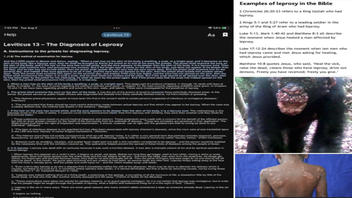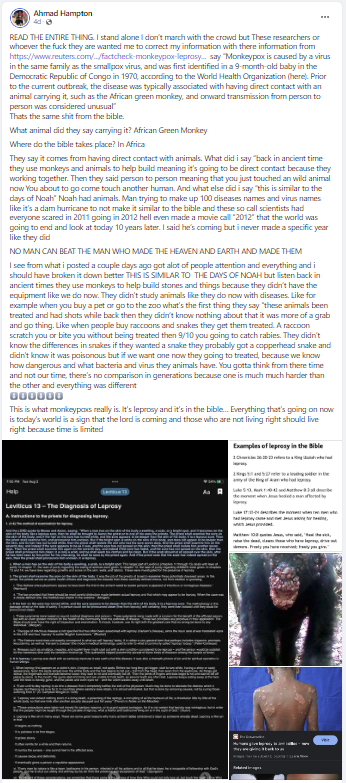STORY UPDATED: check for updates below.

Is monkeypox the same thing as modern-day leprosy or the condition mentioned in the Bible? No, neither is true: Whether using the biblical or today's medical definition, leprosy is very different from monkeypox. "In ancient times, leprosy was a 'catchall' term for any disease that particularly affected the skin," according to The Leprosy Mission International. In an email to Lead Stories, the Health Security Agency in the United Kingdom (UKHSA) said, "Leprosy is caused by a bacteria, monkeypox by a virus, they are different infections."
The claim appeared in a Facebook post on August 4, 2022, under the title "READ THE ENTIRE THING." It opened:
I stand alone I don't march with the crowd but These researchers or whoever the fuck they are wanted me to correct my information with there information from https://www.reuters.com/.../factcheck-monkeypox-leprosy... say "Monkeypox is caused by a virus in the same family as the smallpox virus, and was first identified in a 9-month-old baby in the Democratic Republic of Congo in 1970, according to the World Health Organization (here). Prior to the current outbreak, the disease was typically associated with having direct contact with an animal carrying it, such as the African green monkey, and onward transmission from person to person was considered unusual"Thats the same shit from the bible.What animal did they say carrying it? African Green MonkeyWhere do the bible takes place? In Africa
(Source: Facebook screenshot taken on Tue Aug 9 14:27:16 2022 UTC)
After a lengthy explanation, the Facebook post concludes:
This is what monkeypoxs really is. It's leprosy and it's in the bible... Everything that's going on now is today's world is a sign that the lord is coming and those who are not living right should live right because time is limited
The condition described as leprosy in the Bible was considered a sign of uncleanliness or a curse from God. Many researchers believe it is not the same thing as what we refer to as leprosy today. This is how The Leprosy Mission International describes the condition as it was known then:
Leprosy is referred to several times in the Bible, both in the Old and New Testaments. Jesus is said to have healed persons affected by leprosy and there are a handful of people throughout the Old Testament who are said to have had leprosy.
In ancient times, leprosy was a 'catchall' term for any disease that particularly affected the skin. This means it is possible that the individuals associated with leprosy in the Bible may well have had a different skin disease from what we today know as leprosy.
Regardless of this, those who were perceived to have leprosy in the regions where the Bible was written were considered the lowest in society. They faced rejection and were beggars who lived on the side of the road. In Jesus' culture, it was forbidden for Rabbis to touch people who were classed as 'unclean', which included those affected by leprosy.
Echoing the UKHSA (above), the Public Health Agency of Canada said, "Monkeypox and Leprosy are not the same thing," in an August 9, 2022, email to Lead Stories:
Leprosy, also called Hansen's disease, is a chronic disease of the skin, peripheral nerves and the mucosa of the upper airway (the nose and throat) caused by the bacterium Mycobacterium leprae. Leprosy has afflicted mankind since ancient times, carrying with it a legacy of mutilation, rejection and exclusion from society. It is estimated that there are 1-2 million people worldwide who have leprosy and who require care by the community in which they live. Leprosy is rare in Canada.
Monkeypox is a viral zoonotic infectious disease caused by an Orthopoxvirus, which also includes smallpox, vaccinia, and cowpox. Person-to-person transmission can occur through direct contact with an infected person or shared contaminated objects. Historically, monkeypox has presented with a characteristic rash, which could be preceded by systemic manifestations such as fever. Lymphadenopathy is a feature that helps to differentiate monkeypox from other diseases with a similar rash (such as chickenpox). Presentation of cases during the current outbreak has not always been typical. Please refer to What's unique to the 2022 multi-country outbreak section for additional details.
In an August 10, 2022, email to Lead Stories, Ireland's Health Service Executive said this about the two infections:
Monkeypox and leprosy are two quite distinct and completely separate and unrelated infectious diseases. Both diseases are zoonoses (diseases passed from vertebrate animals to humans), they both produce skin rashes, and can affect the upper respiratory system, each of these features providing a method of spread from person to person. But after that, any similarity between the two infections ends.
Human monkeypox infection is an uncommon, occasionally serious acute infectious disease caused by monkeypox virus (MPXV). MPXV belongs to the same group of viruses (Orthopoxviruses), which includes variola major (responsible for smallpox), vaccinia virus (from which smallpox vaccine is derived) and camelpox. MPXV is endemic to (occurs naturally in) Central and West Africa. MPXV was first identified in cynomolgus macaque monkeys in a research facility in Copenhagen in 1958. It was first identified as a human disease in Africa in 1970. Monkeypox is really a misnomer, as the natural hosts (reservoir) of MPXV are thought to be a range of African rodents. Like humans, monkeys and apes can also become infected with MPXV. Until this current global outbreak among gbMSM, most cases of monkeypox were contracted following contact with infected animals (frequently consumed as bushmeat) in Africa. MPXV is spread from person to person by direct contact with skin lesions or, less commonly, by droplet infection from the nose and mouth. ...
Leprosy, on the other hand, is a chronic infectious bacterial disease caused by Mycobacterium leprae, a bacterium that belongs to the same group of bacteria that causes tuberculosis. More than 200,000 cases of leprosy are reported globally each year. Leprosy mainly affects the skin, the peripheral nerves, the upper respiratory tract and the eyes. Leprosy is an ancient human disease - its first historical description date back to at least 600BC. Apart from humans, the only other known hosts of Mycobacterium leprae are armadillos, so virtually all cases of leprosy are passed from person to person. ...
So, in summary, monkeypox and leprosy are two quite distinct diseases - one caused by a virus, the other caused by a bacterium.
Updates:
-
2022-08-10T16:08:27Z 2022-08-10T16:08:27Z Adds context from Ireland's Health Service Executive, edits for clarity.
















